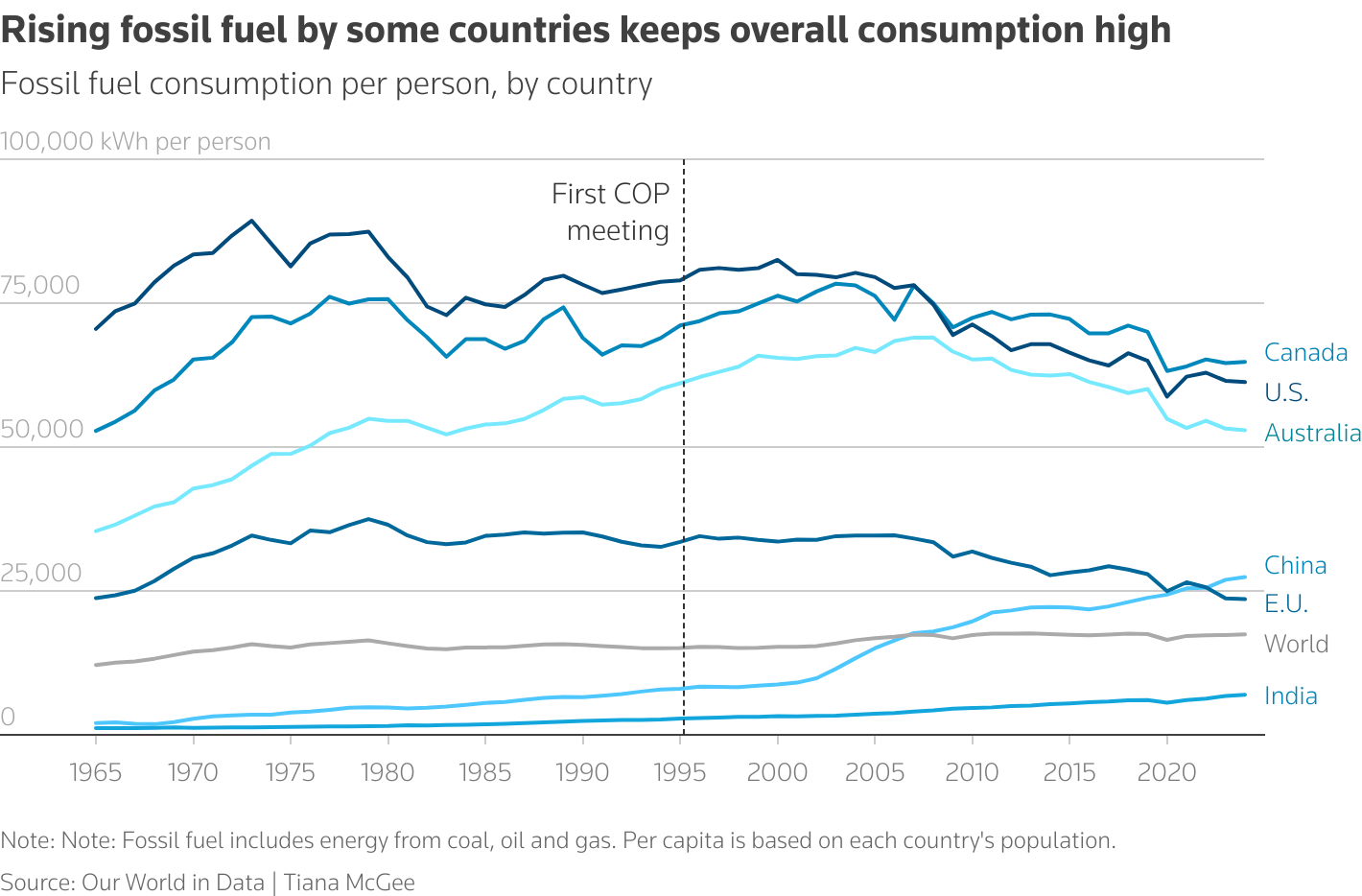Nov 7 (Reuters) – This is an excerpt of the Sustainable Switch Climate Focus newsletter, where we make sense of companies and governments grappling with climate change on Fridays.
To receive the full newsletter in your inbox for free sign uphere.
Sign up here.
Hello!
Today’s newsletter will summarize all the latest from the United Nations’ COP30 climate conference in Brazil. So far, there’s been a scolding, a warning and plenty of deals.
Let’s start with some scolding.
First up, the U.N. Secretary-General Antonio Guterres tore into nations for their failure to limit warming to 1.5 degrees Celsius, as Brazil hosted world leaders for a summit ahead of the COP30 climate conference in the rainforest city of Belem.
“Too many corporations are making record profits from climate devastation, with billions spent on lobbying, deceiving the public and obstructing progress,” Guterres said in his speech. “Too many leaders remain captive to these entrenched interests.”
Countries are spending about $1 trillion each year subsidizing fossil fuels. Leaders have two clear options, Guterres said: “We can choose to lead – or be led to ruin.”
Scientists have confirmed the world is set to cross the 1.5 C warming threshold around 2030, risking extreme warming with irreversible consequences. Click here for my YouTube short video about that report.
Now for the warning, as Brazil’s President Luiz Inacio Lula da Silva warned that “extremist forces” were spreading lies about climate change for political gain, as he urged fellow leaders at a global climate summit in Brazil to take action against global warming.
One of those forces he may have been alluding to was none other than U.S. President Donald Trump, who made his views clear at the U.N. General Assembly in September when he described climate change as the world’s “greatest con job”.
Three European officials told Reuters the European Union has been preparing for multiple scenarios at COP30 – including the U.S. skipping it entirely, actively participating and seeking to block deals, or staging sideline events to denounce climate policies.
Want to get more insight on COP30 deals? Since I’ve reached my word limit, how about checking out this exclusive story on European nations throwing their weight behind a $2.5 billion plan to save the Congo rainforest or how a climate finance platform co-founded by MUFG, Japan’s biggest financial group, has raised an initial $600 million to help countries in developing markets adapt to the impacts of climate change.
WHAT TO WATCH
Click here for a video of representatives of Indigenous communities performing a ritual outside the COP30 venue as the World Leaders Climate Action Summit kicked off.
If you’re in the mood for another climate protest story, then check out French artist James Colomina’s art installation on drowning life-size red figures floating face down in an Amsterdam canal and holding a flag reading “I’m fine” to protest global climate change policy.
NUMBER OF THE WEEK
$1.3 trillion
That’s the amount needed per year to scale climate finance according to COP30 host Brazil.
The almost 100-page document, dubbed the Baku to Belem Roadmap, follows months of talks with stakeholders since the close of last year’s event in Azerbaijan. Providing more finance is central to maintaining trust in multilateral climate efforts as emissions continue to rise, leaving some of the poorest countries at more risk of extreme weather events.
CLIMATE LENS
 Line chart showing global fossil fuel consumption per person from 1965 to 2023, persisting at high levels in the 30 years since the first COP meeting.
Line chart showing global fossil fuel consumption per person from 1965 to 2023, persisting at high levels in the 30 years since the first COP meeting.
I noticed this graphic in an excellent piece by Reuters reporters Valerie Volcovici and Richard Valdmanis on the 30 years since the first COP that I used in yesterday’s newsletter, and spotted a little something. Can you guess what it is? It’s Canada’s place on the chart! The number one fossil fuel consumer. Canada has often gotten off lightly in the discussion on high fossil fuel usage with the usual culprits bearing the brunt of criticism – the U.S., China, Russia, and the EU.
In fact, Canada’s new Prime Minister Mark Carney used his first budget to scrap a cap on oil and gas emissions in favor of other measures like strengthened industrial carbon pricing and the deployment of carbon capture and storage technology. The move has been criticized by some members of his own party for backing away from the Liberals’ focus on the environment. Click here for more on the story.
Sustainable Switch Climate Focus was edited by Mark Potter
Our Standards: The Thomson Reuters Trust Principles., opens new tab
Purchase Licensing Rights


AloJapan.com